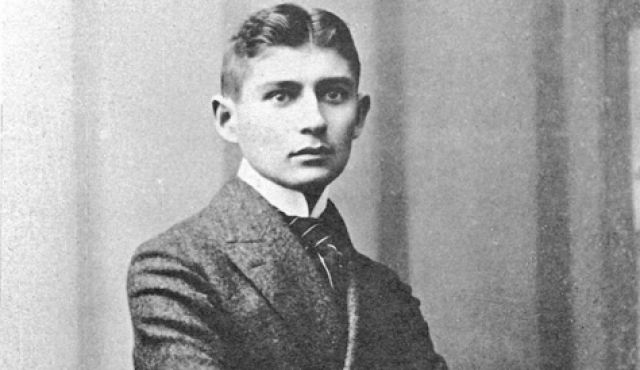
We’ve all had the experience, punctuated by interminable waiting, of circling over and over again through some enormous company’s automatic telephone answering system. Whether or not it counts as genuinely “Kafkaesque” may be up for debate, but we do have some evidence that the technology itself, or at least the idea of it, does indeed trace back to the author of The Metamorphosis and The Trial himself. This comes out in Kafka biographer Reiner Stach’s new book of photographs, letters, and other discoveries called Is that Kafka? 99 Finds.
“Although Kafka was timid and skeptical in his interactions with the latest technical gadgets—particularly when they intervened in social communication—he was always fascinated by people who knew how to handle these devices as a matter of course,” writes Stach in an excerpt at the Paris Review. “That included his fiancée Felice Bauer, who worked in the Berlin offices of Carl Lindström AG, where she was in charge of marketing for the ‘parlograph,’ a dictation machine.” It must have required no great leap of Kafka’s formidable imagination to dream up “a cross between a telephone and a parlograph,” which he described in a 1913 letter to Bauer:
The invention of a cross between a telephone and a parlograph, it really can’t be that hard. Surely by the day after tomorrow you’ll be reporting to me that the project is already a success. Of course that would have an enormous impact on editorial offices, news agencies, etc. Harder, but doubtless possible as well, would be a combination of the gramophone and the telephone. Harder because you can’t understand a gramophone at all, and a parlograph can’t ask it to speak more clearly. A combination of the gramophone and the telephone wouldn’t have such great significance in general either, but for people like me, who are afraid of the telephone, it would be a relief. But then people like me are also afraid of the gramophone, so we can’t be helped at all. By the way, it’s a nice idea that a parlograph could go to the telephone in Berlin, call up a gramophone in Prague, and the two of them could have a little conversation with each other. But my dearest the combination of the parlograph and the telephone absolutely has to be invented.
The modern answering machine took some time to develop, attaining its first commercially successful form, the Electronic Secretary, in 1949, a quarter-century after Kafka’s death. But alas, unbeknownst to him, someone had also beaten him to it when first he thought it up. “The combination of a telephone and a dictation machine had already been invented and patented — including the functions of an answering machine,” writes Stach, citing the engineer Ernest O. Kumberg’s invention of something called the “Telephonograph” in 1900. This might seem like just one more disappointment in a life full of them, but remember: just over a century on, when voicemail and even newer technologies have replaced the answering machine, nobody describes anything with the word “Kumbergian.”
You can pick up a copy of Is that Kafka? 99 Finds here.
Related Content:
Find Works by Kafka in our Free eBooks collection
Franz Kafka’s Kafkaesque Love Letters
The Art of Franz Kafka: Drawings from 1907–1917
The Animated Franz Kafka Rock Opera
What Does “Kafkaesque” Really Mean? A Short Animated Video Explains
Download Jim Rockford’s Answering Machine Messages as MP3s
Mark Twain’s Patented Inventions for Bra Straps and Other Everyday Items
Based in Seoul, Colin Marshall writes and broadcasts on cities and culture. He’s at work on a book about Los Angeles, A Los Angeles Primer, the video series The City in Cinema, the crowdfunded journalism project Where Is the City of the Future?, and the Los Angeles Review of Books’ Korea Blog. Follow him on Twitter at @colinmarshall or on Facebook.


Leave a Reply